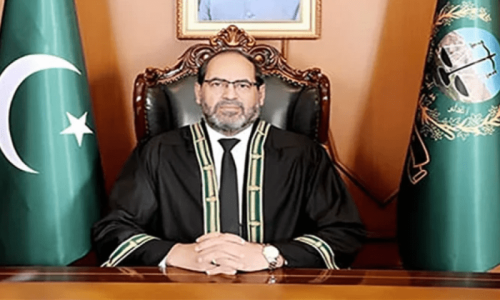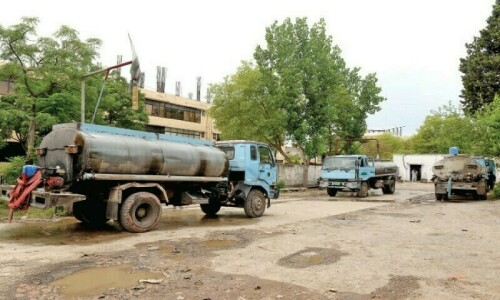THE compound has been demolished and the wives shipped off to Saudi Arabia. In the one year since Osama bin Laden’s death the physical evidence of his presence, his home and household have all but been eliminated from Pakistani soil.
If these demolitions and departures were indicators of the end of an era, the dislocation of terror and its tentacles in Pakistani soil then Pakistanis could all have heaved a collective sigh of relief on this day and marked it as the moment when they kissed terror and its bloody legacy good bye.
As history or fate would have it, such sentimental scenes are not destined for Pakistan. According to the South Asia Terrorism Portal, the country saw 476 major incidents of terrorism (major classified as involving three or more deaths) in 2011.
The worst of them came not before but after the raid on Osama bin Laden’s compound, when 90 people, paramilitary and civilians were killed as two suicide bombers attacked an FC training centre in Charsadda.
The attacks have continued unabated since, the period from January until April of this year 2012 already having witnessed 201 bomb blasts with hundreds killed and injured. The year and a half period from 2011 to the middle of 2012, has seen more people die of terrorist attacks in Pakistan than Americans in the whole decade since 9/11.
Pakistan’s casualties from terror are not simply those who have died in the attacks themselves. Every dying man and woman to fall in the unfortunate path of the suicide bomber or automated blast has left behind him or her an unseen mourning horde of those that must live on, lives forever interrupted, inexplicably and unjustly.
The conflict between security forces and terrorists has wreaked its own havoc in the enactment of Pakistan’s terror tragedy. A few weeks ago, UNHCR, the UN refugee agency, announced that 208,000 internally displaced people are now living in the Jalozai camp in Nowshera since January of this year, a number said to represent only 15 per cent of the actual people displaced from their homes.
Many of these wandering victims of terror, homeless and hungry, are just as hapless as the dead According to Oxfam, nearly half a million people are in dire need of humanitarian assistance, with a recent influx of 63,000 families putting tremendous stress on the resources available. Nearly 80 per cent of the displaced families have no access to healthcare or medicines.
When the death of Osama bin Laden was announced a year ago today, those assessing the success or defeat of the war on terror from the safe distance of faraway lands rejoiced and believed. A poll conducted in Pakistan days after found Pakistanis unsure.
Conducted by YouGov, in collaboration with Polis at Cambridge University, the poll found that 66 per cent of educated Pakistanis did not believe that Osama Bin Laden was killed in the attack.
Another poll, conducted by Gallup International also conducted in the immediate aftermath of the raid, found that only 25 per cent of Pakistanis actually believed that the person attacked in Abbottabad that day was Osama bin Laden.
When asked whether terrorism would increase, decrease or remain unchanged, nearly three-quarters of Pakistanis believed that it would increase or at best remain unchanged.
As the ensuing year’s numbers have shown, they were right. Counting casualties, direct and indirect, dead or almost dead, maimed by bombs or bullets delivers a prognosis that shows terror living well and claiming much, hiding in cities and towns and felling young and old with hate or hunger. But the doubt over Osama bin Laden’s death amid the continuation of the very disease it was supposed to cure points to another casualty.
The first decade of the war on terror, punctuated by today’s anniversary of the death of the mastermind most visibly associated with it, has produced not only casualties of flesh and blood but also of truth and belief.
Pakistanis did not doubt Osama bin Laden’s death because the crystal balls or nocturnal visions indicated no cessation in bombings and killings, or because of secretly nursed sympathies that venerated a mass murderer, or any of the other explanations bandied about by those who would magnify the death of the man into an epic victory.
Pakistanis did not believe in the death of Osama bin Laden, because the most tragic, heartrending and invisible casualty of terror in Pakistan has been the death of truth itself.
With the proliferation of terror has come the elevation of secrecy, a new creed practised by governments and intelligence agencies, foreign governments and spymasters, extremist outfits that change names with the seasons and all those who shelter them. This intricate web of the unknown that weaves through every event and breathes souls into the corpses of doubt has meant the end of fact in Pakistan. The bomb blast at a train station, the murder of a journalist, the verdict of a court nothing can be solved or explained or predicted because nothing can be believed.
There are many scars inflicted on the suffering by conflict, this one cast on one and all bleeds everyday and is never bandaged, draining drop by drop the spirit that sustains a nation.
Bleeding internally and externally, one year after Bin Laden’s death, Pakistan is not misunderstood and the truth more so. As the reason for deaths, the causes of catastrophes, the elusiveness of justice or accountability present day-after-day new tableaus of anarchy, it seems laughable and even cruel to consider that many in the world thought and still think that the death of a single evil man could mean much or anything when the deaths of so many innocent others have meant absolutely nothing.
The writer is an attorney teaching political philosophy and constitutional law.











































